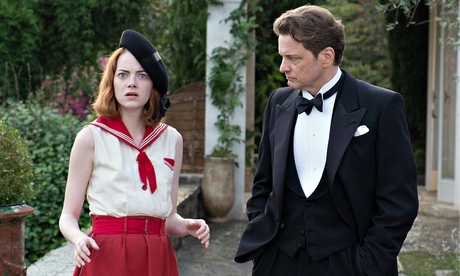
Magic in the Moonlight isn’t Woody Allen’s worst film – that is still probably Hollywood Ending, from 2002 – but it’s still desperately disappointing after the glorious triumph that was Blue Jasmine, last year’s Oscar-winning smash about the cantankerous bankrupt socialite, played by Cate Blanchett. That was authentic Woody Allen, the real deal. There is, on the other hand, something unreal and absent about this lacklustre 1920s period picture, which clunks and clanks along on autopilot, with vague borrowings from PG Wodehouse, Agatha Christie and indeed Woody Allen’s own earlier work. Here, his male and female leads take romantic cover from a storm in an observatory: a throwback to the rainswept Woody and Diane Keaton rushing into the planetarium in Manhattan.
Like the period automobile roadster that at one point in the film breaks down, this movie has some pretty serious engine trouble. Or maybe the problem is that it has no engine to speak of. There are strained performances, weird empty stretches where the gags are supposed to go and some frankly very uncertain line-readings. Set against this are moments of delicacy and absurd charm, all but drowned in the film’s heavy, flavourless stew.
Colin Firth is cast, or typecast, or miscast, as the stuffy and conceited fellow destined to fall, Darcy-ishly, for the woman of whom he very much disapproves. He is Stanley, a British professional magician who performs in the hokey Oriental stage persona of Wei Ling Soo (a name that sounds as if it is some cheeky pun, but isn’t, unless Wailing Sue counts) with silly flowing robes, fake drooping moustache and bald cap. As well as being a magician, Stanley is an atheist and rationalist, a crusading debunker of all the fraudsters and phoney seance-hucksters preying on the rich and credulous in the jazz age. One summer, Stanley ventures to the south of France, dead set on taking down a supposed spiritualist called Sophie (Emma Stone) whose apparent powers are dazzling fashionable society on the Côte d’Azur; these wealthy chumps are getting out their cheque books to fund a supposed spiritual research foundation being set up by Sophie and her hard-faced mamma (Marcia Gay Harden). But Sophie’s extraordinary telepathic abilities and beauty leave Stanley stunned. Could magic – and the magic of love – be more real than he thought?
Magic has always played an important role in Woody Allen’s work, but it has always tended to be real magic. Kugelmass really can transport himself into Madame Bovary in his short story The Kugelmass Episode; characters really can come down from the screen in The Purple Rose of Cairo; Leonard Zelig really does transform, chameleon-like, to become like the people he’s talking to. In Magic in the Moonlight, Stanley wonders, dumbstruck, about the seductive or dangerous possibilities of something he anachronistically calls “magical thinking”, but Allen has long ago proved himself a master of this kind of thinking with his inspired fantasies: the prerogative of both fiction and comedy.
This is a different type of story about magic, and there is no reason why a rationalist movie about tricks shouldn’t be as light and soufflé-ish as everything else. But Firth’s character is just so boorish and monotonous, charmless and unrelaxed. He’s presumably supposed to be as airy and debonair as Cary Grant. Instead, he glowers like Gordon Brown. The problem is not deciding to laugh at him or with him, it’s finding any occasion for laughter at all. Well, the mechanics of the country house mystery in which Stanley finds himself provide some amusement, and there is some diversion to be had in the final revelation.
Perhaps going to a new Woody Allen film is now the nearest thing audiences in the 21st century can have to seeing a run-of-the-mill prewar studio picture. We idolise and fetishise the great pictures from this period and forget about the fact that the dream factory churned out an awful lot of dross as well as the gold. The sheer volume of production is what increased the likelihood of excellence and this allows posterity to pick and choose the classics and forget the rest. It’s the same with Woody Allen. With remarkable and undimmed stamina, he just keeps making movies and I now think it’s beside the point for critics (like me) to complain about his workrate. This is his creative style. Even at its lowest ebb it still produces moments of interest. And it is capable of throwing out something like Blue Jasmine. It might still do in the future. So I am not complaining.

